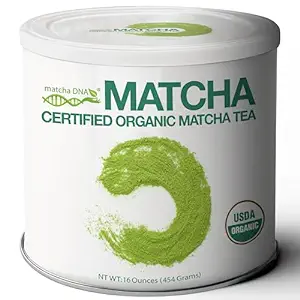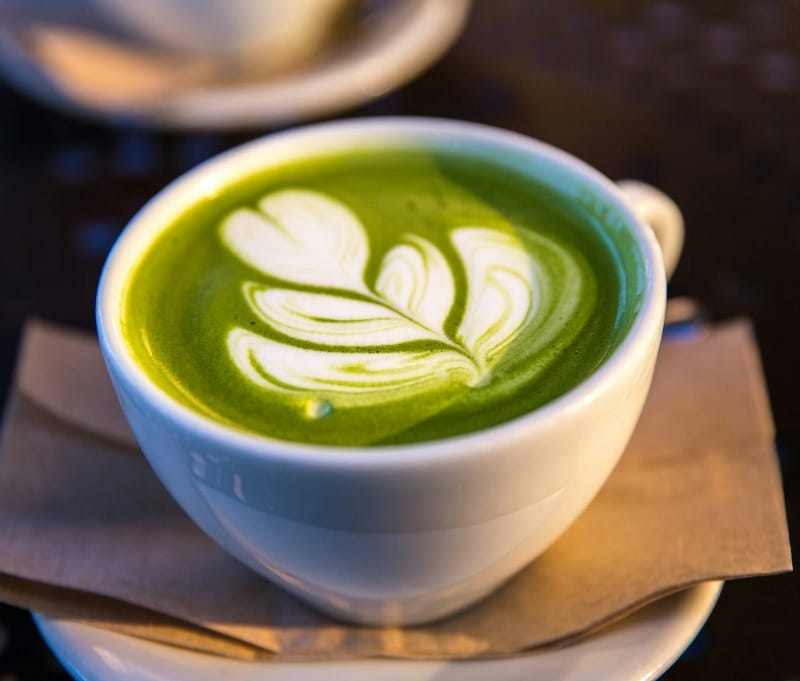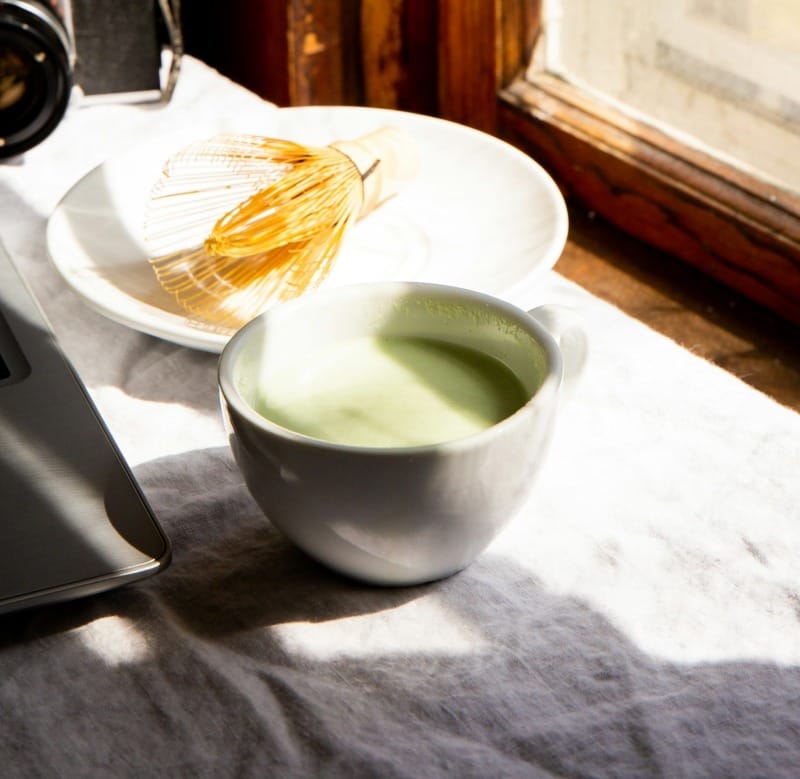Matcha has become increasingly popular as a trendy health drink, but many people wonder about its caffeine content. As longevity science researchers, we decided to investigate the facts about caffeine in matcha and how it compares to other caffeinated beverages. What we found may surprise you.

Key takeaways:
• Matcha contains more caffeine than regular green tea
• The caffeine in matcha is released more slowly for sustained energy
• Matcha provides unique cognitive benefits beyond just caffeine
How much caffeine is actually in matcha?
Matcha does indeed contain caffeine, and typically more than regular green tea. Studies have found that matcha contains between 18.9 and 44.4 milligrams of caffeine per gram of tea powder[1]. For comparison, regular green tea usually contains 11.3 to 24.67 mg of caffeine per gram[2].
However, the amount of caffeine in a prepared cup of matcha can vary widely depending on how it's prepared. A typical serving of matcha uses 2-4 grams of powder, which would provide approximately 38-176 mg of caffeine[1]. This is comparable to a cup of coffee, which averages around 95 mg of caffeine[3].
The caffeine content can also vary based on factors like:
• The quality and processing of the matcha
• Water temperature used for preparation
• Steeping time
• Whether milk is added
So while matcha does contain a significant amount of caffeine, the exact amount in your cup may differ.

A unique caffeine experience
What sets matcha apart from other caffeinated drinks is how the body processes its caffeine. The L-theanine in matcha interacts with caffeine to produce a more balanced, sustained energy boost without the jitters or crash often associated with coffee[4].
This "calm alertness" is why matcha has long been used by Buddhist monks to maintain focus during meditation. The combination of caffeine and L-theanine has been shown to improve attention, reaction time, and memory[5].
Beyond caffeine: Matcha's cognitive benefits
While caffeine certainly plays a role in matcha's effects, it's not the whole story. Matcha is rich in beneficial compounds like catechins, particularly epigallocatechin gallate (EGCG). These antioxidants have been linked to improved brain function and protection against cognitive decline[6].
One study found that consuming matcha improved attention and psychomotor speed in older adults, beyond what could be attributed to caffeine alone[7]. This suggests matcha's unique combination of compounds may provide cognitive benefits that caffeine can't match on its own.
Matcha vs. coffee: How do they compare?
For those looking to swap their morning coffee for matcha, here's how they stack up:
| Aspect | Matcha | Coffee |
|---|---|---|
| Caffeine content | 38-176 mg per serving | 95 mg per cup (average) |
| Energy curve | Gradual rise, sustained | Quick spike, potential crash |
| Additional benefits | Rich in antioxidants, L-theanine | Some antioxidants |
| Preparation | Whisked into water or milk | Brewed, various methods |
While both provide a caffeine boost, matcha offers a more balanced energy experience along with additional health benefits.
Should you be concerned about matcha's caffeine?
For most healthy adults, moderate matcha consumption is safe and may even be beneficial. However, those sensitive to caffeine or with certain health conditions should exercise caution.
Pregnant women are often advised to limit caffeine intake, including from matcha. One study found that higher caffeine consumption during pregnancy was associated with slightly lower birth weights[8].
It's always best to consult with a healthcare professional about your individual caffeine tolerance and any potential interactions with medications.
Conclusion:
Matcha does contain caffeine, often in amounts comparable to coffee. However, its unique composition provides a different energy experience and potential cognitive benefits beyond caffeine alone. As with any caffeinated beverage, moderation is key.
For those looking to optimize their mental performance and energy levels, matcha may offer an intriguing alternative to traditional caffeine sources. Its combination of sustained energy, cognitive benefits, and antioxidant properties make it a beverage worth considering in your longevity-focused lifestyle.
Interested in learning more about how different foods and beverages can impact your cognitive function and longevity? Subscribe to our newsletter for the latest research and insights from our team of longevity science researchers.
References:
- https://www.ncbi.nlm.nih.gov/pmc/articles/PMC7796401/
- https://www.ncbi.nlm.nih.gov/pmc/articles/PMC8156288/
- https://www.fda.gov/consumers/consumer-updates/spilling-beans-how-much-caffeine-too-much
- https://pubmed.ncbi.nlm.nih.gov/18296328/
- https://www.ncbi.nlm.nih.gov/pmc/articles/PMC6836118/
- https://www.ncbi.nlm.nih.gov/pmc/articles/PMC6213777/
- https://www.mdpi.com/2072-6643/13/5/1700
- https://jamanetwork.com/journals/jamanetworkopen/fullarticle/2790149
Citations:
[1] https://www.healthifyme.com/us/
[2] https://www.ncbi.nlm.nih.gov/pmc/articles/PMC7796401/
[3] https://www.ncbi.nlm.nih.gov/pmc/articles/PMC8156288/
[4] https://drink-mission.com/en-eur/blogs/mission/does-matcha-contain-caffeine
[6] https://www.medicalnewstoday.com/articles/does-matcha-have-caffeine
[7] https://magazine.coffee/blog/9/5761/the-matcha-story
[8] https://www.sciencedirect.com/science/article/pii/S2665927122002180
[9] https://ujimatchatea.com/blogs/news/caffeine-in-matcha-green-tea















Member discussion